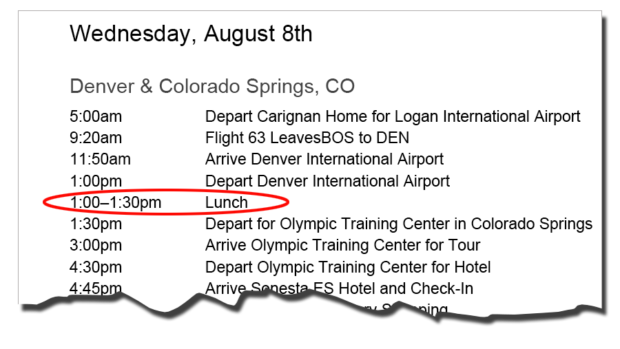This summer, I went on a once-in-a-lifetime trip to the American Southwest with my son’s Boy Scout troop. I didn’t think I’d be learning anything about PowerPoint and presenting on that trip, but as it turned I learned a valuable lesson on the very first day.
Scheduled breaks are very important
Have you ever attended a long meeting at work, a class, a conference? These are usually planned with scheduled gaps in the action: coffee breaks, meal breaks and the euphemistically-titled “bio-breaks.” Smart meeting planners know that the longer people are forced to sit still, the more their attention wanders. Plus, many busy people need to take a few minutes to catch up on communications when they’re taking time out of their workdays to attend events.
And if you’ve scheduled an all-day event, don’t even think about not providing lunch or not releasing people to find their own. Being hangry is a real thing! According to an article in Psychology Today, anger is a physical reaction to being hungry. When we’re hungry our blood glucose levels are low, causing our bodies to produce more stress hormones and triggering genes that control both hunger and anger.
With that in mind, when schedules are created that include breaks, participants count the minutes between them. No matter how fascinating the topic of the meeting/class/conference, people are looking forward to their scheduled rest times. Mess with the breaks and you can count on trouble.
Hangry Scouts ≠ pleasant outing
In August, I traveled to Colorado and Utah with the Boy Scouts. The trip had been planned meticulously and a detailed agenda had been created and distributed. As you can see, we scheduled lunch for 1:00 on August 8.

When we landed at Denver International Airport we had a little mix-up with the rental van, which put us about an hour behind schedule. The 3:00 tour of the US Olympic Training Center couldn’t be changed so, not wanting to be late, the leader decided to drive straight to the OTC. When we arrived at 2:30, we learned that they don’t sell food so we had to skip lunch.
Now, I don’t know what your experience with teenage boys is, but I can tell you for a fact that you don’t want to be around eight of them when they’re hangry. We’d all eaten breakfast at about 4:00 am that morning, twelve and a half hours prior to our arrival at the OTC. The adults sucked it up, but the Scouts were all seriously annoyed and very short tempered. Even though the tour was fascinating and we all learned a lot, by the end of it the Scouts were just about at each others’ throats.
After the tour we went to our hotel, where they were serving free pizza for guests. Mutual throttling averted.
Don’t mess with people’s free time
My big takeaway from this experience is that if you tell people to expect a break or food at a certain time, you need to follow through. Even if they’re not hungry, they’re counting on that down time to stretch, take their “bio breaks,” to catch up on communications, to eat, or just to enjoy a little time to themselves. When you change the schedule without their input or consent, you set the stage for a very unhappy, unproductive event.
